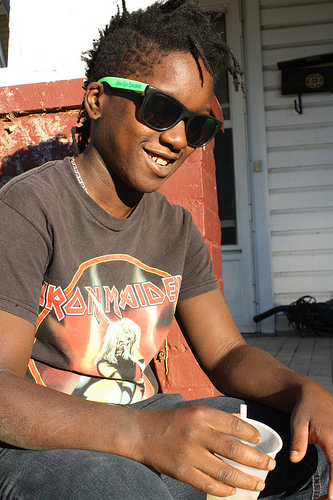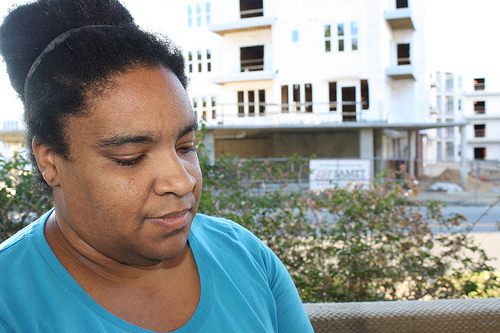by Alex Jung
Pavement Pieces staff

Queenta Allen, 27, a DJ and pastry chef is one of the many young people who go without health insurance. Photo by Alex Jung.
RALEIGH, N.C.—On a rundown porch near Central Prison Hospital, Queenta Allen showed off the fresh burns she had gotten the day before that laced her arms and neck.
Allen, who just turned 28, is a DJ and a pastry chef, and she was working at a bakery when a scalding tray fell on her. Rather than go to the hospital, she planned to take care of it herself, as she always has.
Allen is one of many young people who are uninsured, and go to the hospital only when there is a dire emergency. At 28, she is too old to qualify for her parent’s health insurance, although she isn’t sure that they would have had it anyway. She also doesn’t qualify for Medicaid. In short, she is part of a large number of young people who are not quite poor or sick enough to get federal health insurance.
According to the American Community Survey, men and women ages 25 to 34 make up the largest share—approximately a quarter—of the 374,082 uninsured people in North Carolina.
“I know a lot of people my age who say I’ve got this, this, and this, but I can’t do anything, because I don’t have insurance,” said Allen. “Everyone young and poor is discouraged about their health because they can’t do anything about it.”
Allen also suffers from dentinogenesis imperfecta, a dental abnormality that makes her teeth susceptible to decay and loss. She is afraid to smile because she has lost a number of teeth, and has been unable to get the expensive dental work needed.
“My teeth look like soggy frosted flakes,” she said.
The lack of health care has made caused many young people like Allen to wonder what President Obama’s Affordable Care Act has done for them.
“We’re giving you our backs and our labor and our time and our energy—the least you can do is make sure that we’re taken care of so we can keep working,” said Allen. “It should be a two-way street. Health care is certainly a right.”
“The ACA is supposed to do this, but I don’t see it working right now for people,” said Yolanda Carrington, 34, a friend of Allen’s. Carrington was working three part-time jobs in order to make ends meet.
“For my peers and me who don’t have kids, we don’t qualify,” said Carrington. “You either need to have kids or be near death’s door.”
Carrington begrudgingly supports President Obama for re-election, but finds his campaign’s rhetoric of the middle class off-putting.
“I wish the Obama campaign would talk about poor people. Why do you keep talking about the middle class?” she said. “The middle class has been decimated.”
Instead of regular checkups and dentist’s appointments, the uninsured like Allen and Carrington make use of free clinics when they can, or the emergency room, when they have to.
Cedric Hinton, 32, has seen the inside of an emergency room more often than he would like. He suffered his first heart attack when he was 24 years old. Over the next six years, he would have another five heart attacks, causing irreparable damage to his heart. It was not until Hinton qualified for Medicaid that he was diagnosed with congestive heart failure and given a pace maker and defibrillator.
“I lived on a wing and a prayer,” said Hinton of the years before he had health insurance.
“I can tell the difference where I didn’t have everything in place as far as money wise,” he said. “We’re going to put a Band-Aid on things in other words.”
Allen echoed similar thoughts. “You know that they treat people with insurance differently from people who do. I’m not really down with that.”
“A lot of people without insurance don’t come to a physician’s office until a serious event, and then it would be too late and too expensive to fix,” said Dr. Khanh Vu, who began Vance Family Medicine in Henderson, N.C. 20 years ago.
“One trip to the hospital will cost a patient thousands and thousands of dollars, said Dr. Vu. “It’s a very expensive place to be.”
Dr. Vu believes that the expansion of Medicaid coverage in 2014 is one way to contain the overall cost of health care, so that there would be a greater emphasis on primary and preventive care rather than a reliance on emergency rooms and specialty providers.
“Diabetes and hypertensions are two major conditions that have multiple implications to the body such as heart attack, stroke, loss of limbs,” said Dr. Vu. “You could end up with renal failure and require dialysis which is very expensive for health care overall.”
Earlier this year on January 27th, Allen went to WakeMed around midnight after having what she described as “flu-like symptoms” for a month. It had become difficult for her to breathe, so her father and sister drove up from Wilmington, N.C. to take her to the hospital, where after a ten-hour wait, a doctor diagnosed her with esophageal cysts and wheeled her into surgery immediately.
Had she come a week later, the doctor said she would have died.
For Allen, this is simply part of her daily life.
“What do they call a yearly checkup for a black person?” Allen joked. “The emergency room.”
